- Home
- J. D. Robb
Forgotten in Death
Forgotten in Death Read online
Begin Reading
Table of Contents
About the Author
Copyright Page
Thank you for buying this
St. Martin’s Press ebook.
To receive special offers, bonus content,
and info on new releases and other great reads,
sign up for our newsletters.
Or visit us online at
us.macmillan.com/newslettersignup
For email updates on the author, click here.
The author and publisher have provided this e-book to you for your personal use only. You may not make this e-book publicly available in any way. Copyright infringement is against the law. If you believe the copy of this e-book you are reading infringes on the author’s copyright, please notify the publisher at: us.macmillanusa.com/piracy.
She lived unknown, and few could know
When Lucy ceased to be;
But she is in her grave, and, oh,
The difference to me!
—William Wordsworth
I do perceive here a divided duty.
—William Shakespeare
1
For a homicide cop, murder often started the day. For the mixed-race female sloppily wrapped in a tarp and stuffed in a construction site dumpster, it had surely ended hers.
Lieutenant Eve Dallas ducked under the crime scene tape and strode across the demolition rubble. She’d already been on her way downtown to Cop Central when the call came through, detouring her to one of the construction sites in Hudson Yards.
The day had a soft feel to it, a breezy warmth as May of 2061 made way for June and the heat that would surely follow. Construction types stood around in their hard hats and steel-toed boots, gulping coffee, shooting the shit, and goggling at the dumpster where a couple of uniforms stood by.
Civilians, Eve knew, couldn’t resist goggling at the dead.
She could hear the hard, staccato, machine-gun echo of an airjack at another site. The whole sector, she knew, was full of them.
The dumpster sat on the north side of the seventy-story spear of a building, on the edge where a trio of lesser towers huddled. The trio, post–Urban Wars toss-them-up-and-cross-your-fingers construction, showcased the dinge and wear of the years, the shrugged shoulders of neglect.
She noted broken windows, the pitted, graffiti-laced walls, crumbling facades, old beams now bent and twisted, and the big, muscular machines, the strangely delicate sway of the towering cranes, and the mountain range of lesser tools lined up to deal with them.
To her eye, it resembled the aftermath of a war zone, but the only casualty she could see lay wrapped in a dumpster like so much debris.
Whatever the plans, the schedule, the budget might be, it all stopped now.
The civilians could goggle at the dead, but she stood for them.
She carried her field kit to the cops at the dumpster, tapped her badge. “Who’s first on scene?”
“That would be us, Lieutenant. Officers Urly and Getz.”
“Run it for me,” she said as she took a can of Seal-It from her kit.
Urly, a tall Black woman in her early forties, took the lead.
“Getz and I responded to the call at oh-seven-thirty-five. We confirmed the DB in the dumpster here, and secured the scene. The nine-one-one caller, a Manuel Best, stated he found the body shortly after he reported to work at seven-thirty.”
“Maybe the blood trail gave him a clue.”
Urly’s lips twitched—the closest she got to a smile. “Yes, sir. Best stated he thought someone had dumped a dead or wounded animal in there.”
“He’s pretty shaken up, Lieutenant.” Getz, white, husky, thirties, chin-pointed to the left. “Just a kid, college boy, summer job. Just started this week.”
“Hell of a way to enter the workforce. I’ll want to speak with him when I’m done with the body.”
She stepped up, avoiding the drops of dried blood, and, a tall woman herself, peered into the dumpster.
She could see the side of the victim’s head through the plastic sheeting. Scraggly hair, the color of dust, spilled over it. Blood matted the hair, smeared the sheeting.
Her hand fell out when the killer tossed her in, Eve thought. Rush job, bash, dump, run.
“Severe blunt force trauma to the right side of the victim’s head is visible, as is a blood trail starting approximately four feet from the dumpster on the far side of the security fencing. Blood on the front of the dumpster, on the plastic sheeting used to cover the victim. Likely used to carry the victim to the dump site.”
When she had the interior of the dumpster, the position of the body fully on record, she hissed out a breath.
She sealed up, passed her field kit to Getz.
And boosted herself into the dumpster.
Construction crap—not garbage, so lucky day. But construction crap could include nails, glass, toothy metal, and all kinds of sharps.
“She can’t be more than five-two,” Eve judged as she found a corner of the sheet, drew it up, and exposed more of the head wound. “Blood, bone shards, gray matter. Hand me my kit. Looks to me like…”
She took the kit, pulled out microgoggles. With them, she leaned in. “Yeah, murder weapon’s going to be a crowbar. I can see where the two-pronged hook went in, the flat handle indented.”
Gently, Eve turned the head. “Two strikes, right temple, upper back of the head. One probably did it.”
“Oh hell. Lieutenant, I know her. Getz?”
He rose up a little, leaned in. “Yeah, shit. Sidewalk sleeper, sir. She roamed around this area, did some unlicensed begging.”
“We looked the other way there,” Urly added. “She was harmless. She’d make little flowers or paper animals out of litter, pass them out to anyone who gave her some change, you know?”
“Got a name?”
“No, sir. She used the Chelsea Shelter mostly in the winter or bad weather. Or flopped in one of the condemned buildings here like a lot of them. She didn’t hustle or hassle, but she kept a little book, and wrote people up for rule violations.”
“What kind of violations?” Eve asked as she got out her Identi-pad.
“Jaywalking, littering—she was fierce about littering—shoplifting, trespassing, not picking up your dog’s poop.” Urly shrugged. “She’d write down a kind of description of the violator, the violation, the time and place. She’d hunt up a cop and read off the page. Ask us to make a copy.”
“Mostly, we would, and we’d thank her, give her a couple bucks,” Getz added. “We all called her CC—for Concerned Citizen.”
“Spotty on the ID data, lot of blank spots. But she comes up as Alva Quirk, mixed race, age forty-six. No fixed address. No current employment. No family listed on her ID. We’ll do a run there.”
“Alva,” Urly repeated. “Lieutenant, if it turns out she doesn’t have family, the cops in the Tenth would take care of having her cremated. She was kind of a mascot.”
“I’ll make sure you’re notified. TOD, zero-one-twenty. COD, blunt and sharp head trauma. ME to confirm.”
Eve heard the clomping, recognized pink cowgirl boots. “Peabody,” she said without looking up. “Just in time. Everybody, seal up, and let’s get her out. I can get her up,” Eve said before Getz could climb in with her. “I can get her up and pass her to you.”
It was a process, and not a pleasant one, but Eve slid her arms along and under the plastic, got a grip.
Even deadweight, the victim couldn’t have been more than a hundred pounds.
Urly reached over, took some of that weight, then Getz and Peabody helped lift the legs.
They laid her, the sheet still wrapped around her lower body, on the ground in front of the dumpster.
Ev
e crouched down to check the multiple pockets of Alva’s faded gray baggies. “No book, no nothing.”
“She usually had a backpack, but she kept the book and a pencil in her pocket.”
“Not there now.” She looked back at the dumpster, thought: Fuck.
She looked up at her partner. It still took her an extra instant to adjust to the red tips and streaks in Peabody’s dark, now flippy hair. In fact, Eve thought she registered a few more of both streaks and flips.
“Peabody, Officer Getz is going to take you to the wit who found her. Get his statement. There has to be some security around this site—get copies of any discs or hunt up any security guards. And make sure whoever’s in charge knows this site is shut down until I say otherwise.”
“I got it.”
“Let’s open up the rest of this plastic.”
When she and Urly unwrapped the lower body, Eve saw the stub of a pencil in the ragged cuff of the baggies.
“Pencil stub, caught in the cuff of her pants,” she said for the record as she took out an evidence bag. “Dropped it when she got bashed and it got caught in there. Someone didn’t want to be in her book. I’m not going to find the book or her backpack in that dumpster. Gotta look, but the killer took all that. Missed the pencil, but this was a rush job.”
She sat back on her heels a moment, because she could see it. “Murder weapon may be in there, but smarter, if they were going to leave it, to wrap it up with her. We’re going to find the kill site. Cleaned up some of the blood, but it was dark—even with the security lights, you wouldn’t get it all. And he was sloppy, didn’t wrap her nice and tight, so she started coming out of the sheeting, dripped some blood.
“Maybe she was flopping here for the night. They’ve got the buildings locked up, fenced off while they’re doing what they do, but it’s familiar here, so she comes here for the night. Nice night, who wants to be ass to elbow in a shelter on a nice night? Hears something, sees something. Can’t have that, gotta write that down for my police friends.”
“Oh crap, Lieutenant, that sounds right.”
“Illegals deal, rape, mugging—it’s not going to be littering or dog shit. He could take the book, but what’s to stop her from telling somebody? Only one way to fix that. Where did he get the crowbar? Because that’s what it’s going to be.”
As she spoke, she ran her hands over the victim, checked for other wounds, offensive, defensive. “Just the two strikes to the head. Back of the head when she’d turned away, right temple on her way down, to make sure. Take the book, the backpack, check her pockets and take whatever she has. Get the sheeting—has to know where to find it—wrap her up, carry her over to the dumpster, drop her in.”
“Why not just leave her where she fell?”
“Somebody might come by, find her. You’ve got to get away, ditch that pack, destroy that book, and clean up. You got blood on you, you got spatter. Nobody’s going to find her for hours. Likely a couple hours more than the wit did because of the sloppy.”
“She said to me once, she had to take care of New York because New York took care of her.”
“That’s just what we’re going to do, Officer. We’re going to take care of her.”
Rising, Eve called for the sweepers and for the morgue.
“Stay with the body,” she told Urly, then boosted herself back into the dumpster.
Urly gave her that hint of a smile again. “Those are really nice boots.”
“Well, they were. Describe the book.”
By the time Eve swung out, empty-handed, Peabody was waiting for her.
“The wit just started working for Singer Family Developers, and on this job,” Peabody began. “His uncle’s one of the crew, got him in for the summer. He saw the blood, thought there was an animal in the dumpster, maybe just hurt, so he took a look. Saw the body and, in his words, ‘went freaked.’”
“Did he touch anything?”
“He says no. Too freaked. But he called it in, then tagged his uncle.”
Peabody shifted on her pink boots, careful to keep them away from the dried blood.
“The wit was one of the first on the job this morning—trying to make good—and his uncle was just pulling up. Uncle took a look, too, and they waited for Urly and Getz. While they waited, the uncle—Marvin Shellering—contacted the foreman, who contacted Singer. That’s Bolton Kincade Singer, who took over from James Bolton Singer, his father, about seven years ago. Singer is cooperating. I’ve got security discs, but am told they don’t cover this area—just the buildings. Nothing back here that needs security according to Paulie Geraldi, the foreman.”
Peabody glanced down at Eve’s now scarred and filthy boots. “You know, the sweepers would’ve done that search.”
“Yeah, and they’re going to do another. I had to see if the killer tossed any of her stuff in there with her. Or the murder weapon. Any human security on-site?”
“Not at this point. They have the fencing, the cams, and right now it’s a lot of demo. When they start bringing in new materials, they’ll add to security.”
“A job this size has more than one boss.”
“Right now, it’s demo, and that’s Geraldi.”
“All right.” Eve pulled a wipe from her kit to clean her hands. “We’re going to fan out, find the kill site. The trail leads that way before it stops—or before she started to drip. I’m leaning toward somewhere along the other side of the security fence line, but out of the lights.”
She started along the trail of blood. “We need to run Singer, the foreman, and anyone else who has access inside the fence after hours. We start there and—”
She broke off when a woman—eighteen, maybe twenty—called her name as she ran over the rubble.
T-shirt, Eve noted, jeans, boots, candy-pink hair spilling out of a fielder’s cap.
Eve concluded one of the crew, and wondered if someone had found the kill site for her.
“Lieutenant Dallas.” Her breath whooshed out; sweat streamed down a pretty face nearly as pink as her hair.
“That’s right.”
“I recognized you, and you, Detective. You have to come. You have to come right away.”
“Where and why?”
She pointed. “A body. There’s a body.”
Eve gestured behind her. “That body?”
“No, no, no. Manny—um, Manuel Best—told me about the woman, and I’m sorry, but that’s how I knew you were right here. And I told Mackie I’d run, I’d run right here and get you.”
“You’re saying you found another body?”
“I didn’t, not exactly. Mackie did. Or some of one, and he said work stopped and call the cops, and I said how you were here, and he said go get you. You have to come.”
“Officers! Stay with the victim until the morgue arrives. Secure the scene until the sweepers get here. Where?” she asked the woman.
“We’re about a block up.”
“Part of this construction site?”
“No, no, it’s not part of this. This is Singer Family Developers. We’re on Hudson Yards Village, residential and office buildings, a shopping arcade, and a green space.”
To save time, Eve left her vehicle; taking a block on foot would be quicker.
“Let’s have a name.”
“Oh, sorry. I’m Darlie Allen.”
“And how do you know my witness?”
“Your … oh, you mean Manny. Some of us go for a beer—or a cold otherwise—when we knock off. We just hung out a couple of times since we started. He just started with Singer. And we’re, you know, going to go out this weekend. He tagged me about that poor woman. He was really upset. And somebody told him you were in charge, and then when we found the body, I came to find you.”
“How’d you find the body?”
“We already demoed the main part of the old building. It was a restaurant. We were jacking up the floor, the old concrete platform. The boss says it’s substandard—hell, a good chunk of it had already decayed—
so we’re taking it all. I was watching because I want to learn how to use the jack, and this big piece broke off, and I could see how they were right about it being a crap job in the first place all that time ago, because there was a lot of hollow, and that’s not safe. There’s a cellar below—and that’s already had some cave-in. And it was in there.”
“A body under the concrete? We’re talking remains then. Bones?”
“Yeah, but they came from a body. It’s not like an animal. I didn’t look real close after, because it was sort of awful. But I saw how it was mostly dirt and rotten supports and broken beams under the platform, and the body—remains—that was in a kind of hollow place.”
They came to a set of iron steps manned by a security droid. It nodded at Darlie.
“You’re cleared, Ms. Allen, Lieutenant Dallas, Detective Peabody.”
“It’s up on the platform over the old tracks. We’re revitalizing what they started before the Urbans, then that got all screwed, so they threw up all this substandard after just to get them up, you know.”
“Yeah.”
Boots rang on metal.
“It’s going to be done right this time. Mackie says we’re building an urban jewel, and we’re building it to last.”
She didn’t see a jewel. She saw construction chaos, with a section roped off, and farther north the beginnings of a skeleton that, she assumed, would be one of the residential buildings.
“Who’s in charge?”
“Mackie. I’ll get him.”
“Yeah, do that. But who owns it? Who’s in charge of the project?”
“Um. You are.”
Eve looked into Darlie’s big, puzzled green eyes. And said, “Crap.”
Darlie raced off to where a number of people stood around the roped-off area.
“I can tag Roarke,” Peabody offered. “He’s going to want to know.”
“Yeah.” Her husband, the owner of almost everything in the universe, would want to know. “We’ll see what we’ve got first. Crap,” she said again, and started over as a Black guy who looked like he could curl a couple of the airjacks without breaking a sweat peeled away from the rope and came toward them.

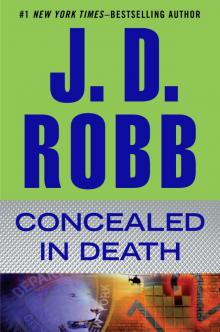 Concealed in Death
Concealed in Death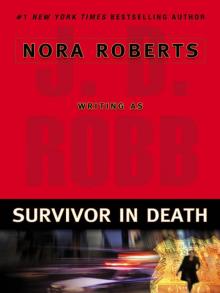 Survivor in Death
Survivor in Death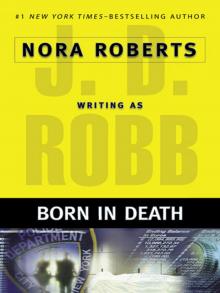 Born in Death
Born in Death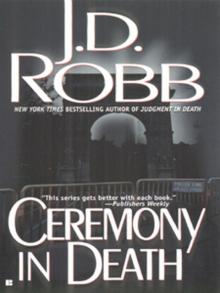 Ceremony in Death
Ceremony in Death Indulgence in Death
Indulgence in Death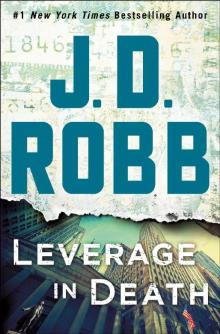 Leverage in Death
Leverage in Death Devoted in Death
Devoted in Death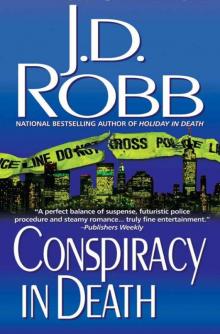 Conspiracy in Death
Conspiracy in Death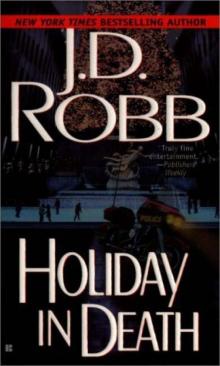 Holiday in Death
Holiday in Death The Unquiet
The Unquiet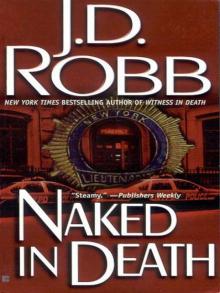 Naked in Death
Naked in Death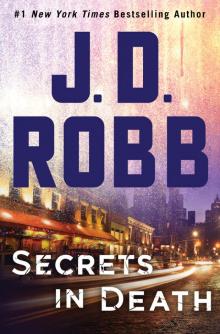 Secrets in Death
Secrets in Death Seduction in Death
Seduction in Death Strangers in Death
Strangers in Death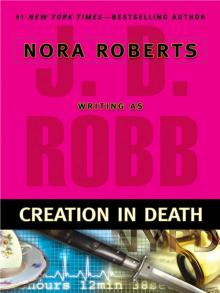 Creation in Death
Creation in Death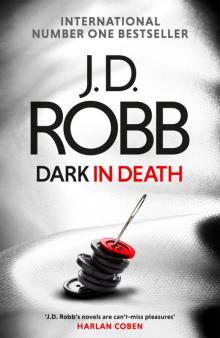 Dark in Death
Dark in Death Possession in Death
Possession in Death Visions in Death
Visions in Death Midnight in Death
Midnight in Death Innocent in Death
Innocent in Death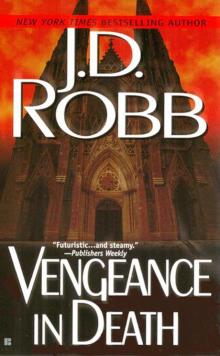 Vengeance in Death
Vengeance in Death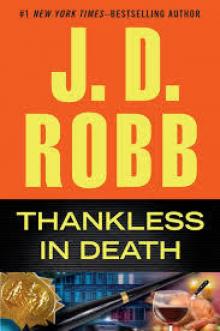 Thankless in Death
Thankless in Death Glory in Death
Glory in Death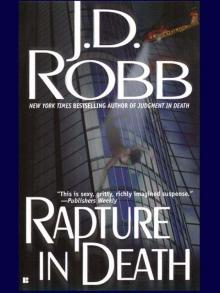 Rapture in Death
Rapture in Death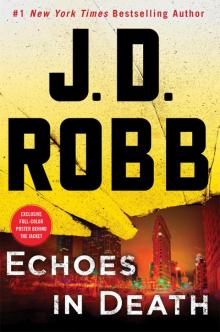 Echoes in Death
Echoes in Death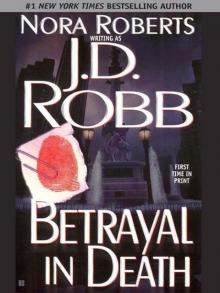 Betrayal in Death
Betrayal in Death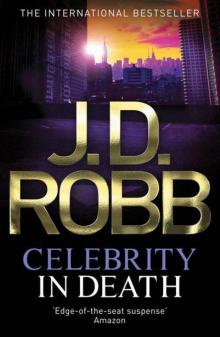 Celebrity in Death
Celebrity in Death Immortal in Death
Immortal in Death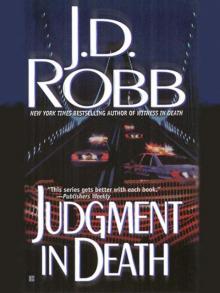 Judgment in Death
Judgment in Death Ritual in Death
Ritual in Death Portrait in Death
Portrait in Death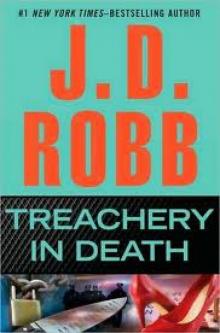 Treachery in Death
Treachery in Death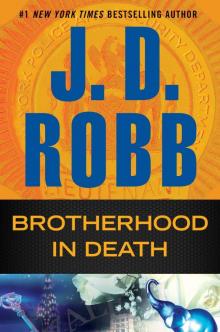 Brotherhood in Death
Brotherhood in Death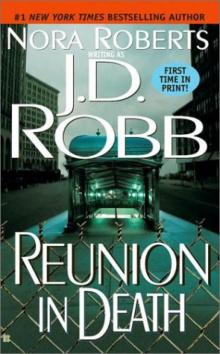 Reunion in Death
Reunion in Death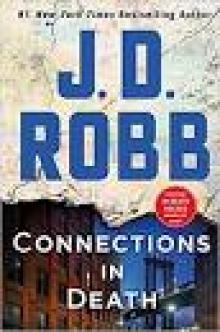 Connections in Death: An Eve Dallas Novel
Connections in Death: An Eve Dallas Novel Imitation in Death
Imitation in Death New York to Dallas
New York to Dallas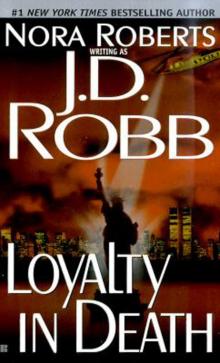 Loyalty in Death
Loyalty in Death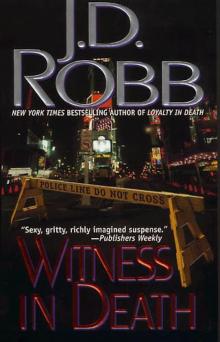 Witness in Death
Witness in Death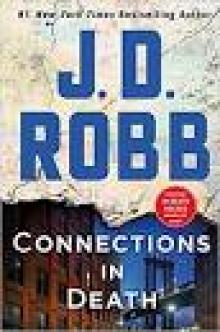 Connections in Death
Connections in Death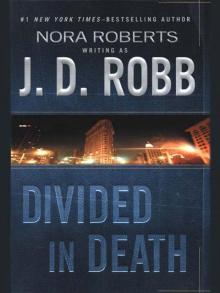 Divided in Death
Divided in Death Obsession in Death
Obsession in Death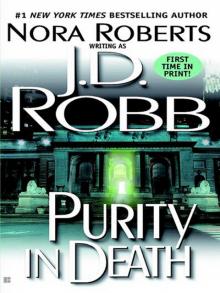 Purity in Death
Purity in Death Festive in Death
Festive in Death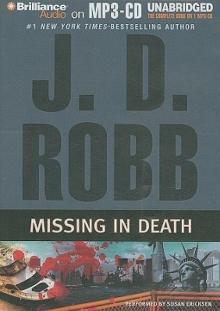 Missing in Death
Missing in Death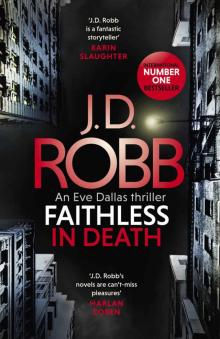 Faithless in Death: An Eve Dallas Thriller (Book 52)
Faithless in Death: An Eve Dallas Thriller (Book 52)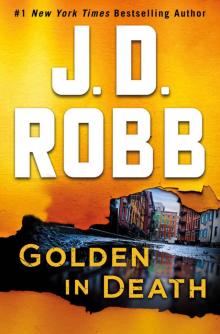 Golden in Death
Golden in Death The In Death Christmas Collection
The In Death Christmas Collection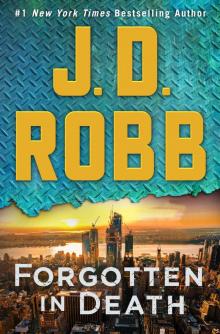 Forgotten in Death
Forgotten in Death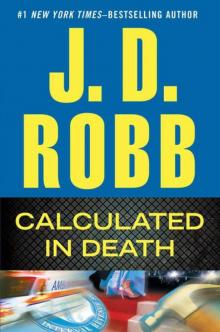 Calculated in Death
Calculated in Death Salvation in Death
Salvation in Death Interlude in Death
Interlude in Death Haunted in Death
Haunted in Death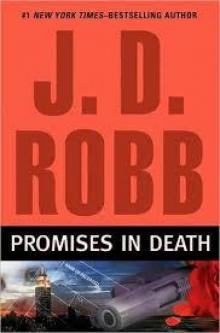 Promises in Death
Promises in Death In Death 07.5 - Midnight in Death
In Death 07.5 - Midnight in Death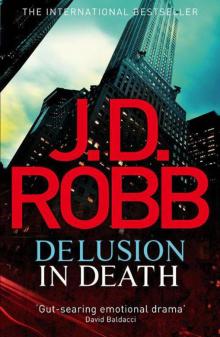 44 Delusion in Death
44 Delusion in Death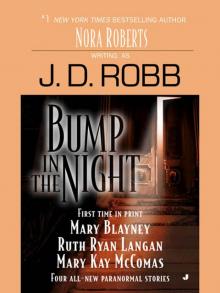 Bump in the Night
Bump in the Night The In Death Collection, Books 16-20
The In Death Collection, Books 16-20![[In Death 17] - Imitation in Death Read online](http://i1.bookreadfree.com/i/03/20/in_death_17_-_imitation_in_death_preview.jpg) [In Death 17] - Imitation in Death
[In Death 17] - Imitation in Death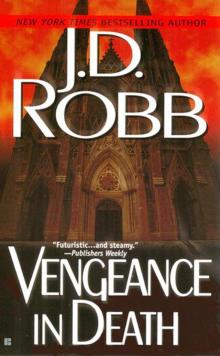 In Death 06 - Vengeance in Death
In Death 06 - Vengeance in Death Dead Of Night
Dead Of Night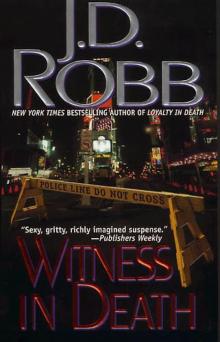 In Death 10 - Witness in Death
In Death 10 - Witness in Death![[In Death 16] - Portrait in Death Read online](http://i1.bookreadfree.com/i1/03/27/in_death_16_-_portrait_in_death_preview.jpg) [In Death 16] - Portrait in Death
[In Death 16] - Portrait in Death Possession in Death edahr-39
Possession in Death edahr-39 Remember When edahr-20
Remember When edahr-20 Big Jack
Big Jack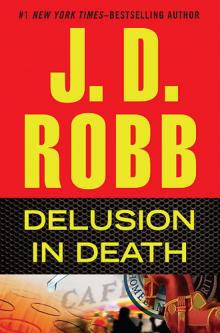 Delusion in Death edahr-44
Delusion in Death edahr-44 Missing in Death edahr-36
Missing in Death edahr-36 Origin in Death edahr-24
Origin in Death edahr-24![[In Death 18] - Divided in Death Read online](http://i1.bookreadfree.com/i1/04/03/in_death_18_-_divided_in_death_preview.jpg) [In Death 18] - Divided in Death
[In Death 18] - Divided in Death The Lost
The Lost![[In Death 05] - Ceremony in Death Read online](http://i1.bookreadfree.com/i1/04/01/in_death_05_-_ceremony_in_death_preview.jpg) [In Death 05] - Ceremony in Death
[In Death 05] - Ceremony in Death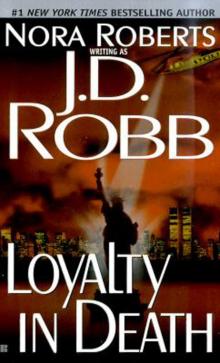 In Death 09 - Loyalty in Death
In Death 09 - Loyalty in Death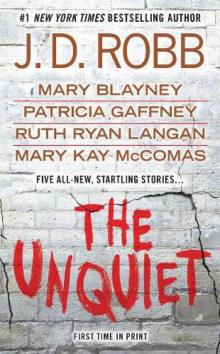 Chaos in Death edahr-42
Chaos in Death edahr-42 In Death 12.5 - Interlude in Death
In Death 12.5 - Interlude in Death![In Death [47] Leverage in Death Read online](http://i1.bookreadfree.com/i1/04/01/in_death_47_leverage_in_death_preview.jpg) In Death [47] Leverage in Death
In Death [47] Leverage in Death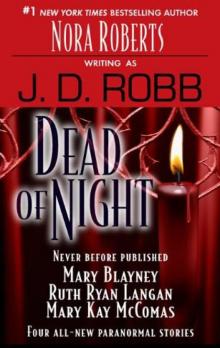 In Death - 24.50 - Dead of Night
In Death - 24.50 - Dead of Night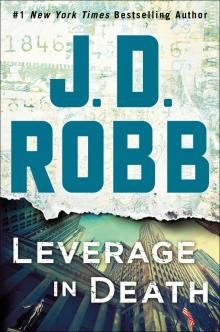 Leverage in Death--An Eve Dallas Novel
Leverage in Death--An Eve Dallas Novel![[In Death 24] - Innocent in Death Read online](http://i1.bookreadfree.com/i1/04/05/in_death_24_-_innocent_in_death_preview.jpg) [In Death 24] - Innocent in Death
[In Death 24] - Innocent in Death![[In Death 15] - Purity in Death Read online](http://i1.bookreadfree.com/i1/04/05/in_death_15_-_purity_in_death_preview.jpg) [In Death 15] - Purity in Death
[In Death 15] - Purity in Death The In Death Collection, Books 26-29
The In Death Collection, Books 26-29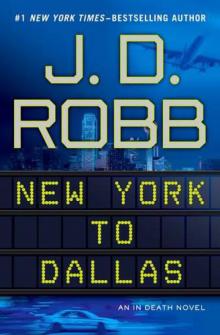 New York to Dallas edahr-41
New York to Dallas edahr-41 The Other Side
The Other Side The In Death Collection 06-10
The In Death Collection 06-10![[In Death 08] - Conspiracy in Death Read online](http://i1.bookreadfree.com/i2/04/05/in_death_08_-_conspiracy_in_death_preview.jpg) [In Death 08] - Conspiracy in Death
[In Death 08] - Conspiracy in Death The In Death Collection, Books 21-25
The In Death Collection, Books 21-25 Memory in Death edahr-25
Memory in Death edahr-25 The In Death Collection, Books 30-32
The In Death Collection, Books 30-32 Down the Rabbit Hole
Down the Rabbit Hole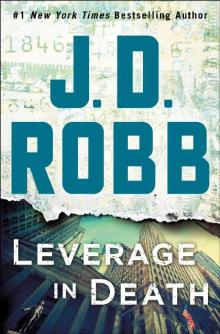 Leverage in Death: An Eve Dallas Novel (In Death, Book 47)
Leverage in Death: An Eve Dallas Novel (In Death, Book 47) The In Death Collection, Books 6-10
The In Death Collection, Books 6-10 The In Death Collection, Books 11-15
The In Death Collection, Books 11-15 Celebrity in Death edahr-43
Celebrity in Death edahr-43 Treachery in Death edahr-40
Treachery in Death edahr-40![[In Death 12] - Betrayal in Death Read online](http://i1.bookreadfree.com/i2/04/13/in_death_12_-_betrayal_in_death_preview.jpg) [In Death 12] - Betrayal in Death
[In Death 12] - Betrayal in Death The In Death Collection, Books 1-5
The In Death Collection, Books 1-5